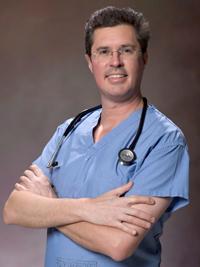
Dr. Rick Boulay is the Director of Gynecologic (GYN) Oncology at Lehigh Valley Hospital in Allentown, Pennsylvania, and the founder of The Catherine Boulay Foundation. As a cancer surgeon and the husband, son, and grandson of cancer survivors, he writes, speaks, and connects with others to share the wisdom of cancer survivorship.
As a practicing GYN oncologist, I have spoken the words, “I’m sorry, you have cancer,” or some version of that sentence, thousands of times. And although my delivery is fairly consistent, modified only slightly to improve understanding, my patients’ responses vary from stunned silence to uncontrollable, overwhelming cataplexy. The stalwart emphatically reply, “I’m gonna beat this thing,” but the vast majority tentatively wonder, “How long do I have?” and retreat into a jumbled, dark world of fear and the expectation of horrific treatment followed only by painful death.
We all know someone who has been through this. Or perhaps we’ve been there ourselves. We’ve cried the tears. We’ve felt the anguish. We’ve heard the stories. We’ve seen it on TV—those pictures, those terrible heart-wrenching photos of bald sick kids.
It’s real. We know what we know.
Or do we?
More recent data tell a different story. Are you aware that nearly 70% of people diagnosed with cancer in the United States live for more than five years? That most childhood cancer cure rates are over 85%? That even the most resistant cancers, like melanoma, are having stunning responses to newer immune-modulating treatments? That newer classes of drugs targeted directly at the abnormal processes within cancerous cells are showing tremendous promise of well-tolerated, long-term treatment?
We still have a ways to go, but there is definite improvement.
Maybe it’s a knowledge deficit. Perhaps folks just haven’t seen the improvements yet. Or perhaps, as in my case, we reflexively go back to that dark place of cancer stereotypes when we hear … well, when we hear “that sentence.”
Seven years ago, my family and I retreated into the fearful, jumbled world of cancerism when my wife, the mother of our young daughters, was diagnosed with leukemia at the age of 44. Leukemia is not a disease I treat, yet I know it well. My uncle died horribly of leukemia after three years of nonstop treatment at the age of 47… in 1987. This experience colored, or better said, totally biased, my expectation of our future. I began to mentally explore how we would get through the next three awful years, and then how I would manage as a single father, alone at our daughters’ graduations and weddings. I gave away all the hopes and dreams of my family’s future. I caved from my cancerism.
Yet the last seven years, as a result of a targeted leukemia treatment called imatinib (Gleevec), brought us one valedictorian graduation speech, one acceptance to medical school, multiple concerts and performances, as well as the daily squibbles and squabbles of an intact young family. My wife, aside from the daily reminder of taking her medication, leads a full and active life.
Within my practice, I still see the corruption of cancerism daily. As I had given away my hopes and dreams, I see others give away their precious days and even their very lives. It is time now to change our expectations. There are many reasons to hope, nearly 14.5 million in fact, the number of cancer survivors living in the United States today. 
